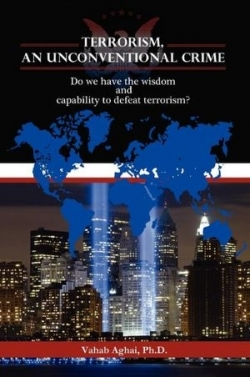Terrorism, An Unconventional Crime
“The death of Osama bin Laden will not put an end to terrorism,” cautions Dr. Vahab Aghai in his short, tightly written, and quite thorough primer, Terrorism, An Unconventional Crime. While bin Laden’s death was a satisfying victory for the West, it was “more of a symbolic loss than a real one” to al-Qaeda, explains the noted scholar. “The ideology that he fostered, however, was another thing. It will continue and endure until his last supporter dies.”
Aghai is not an apologist for terrorism, but he is a realist who has made a thorough study of the subject. If there is one recurring theme in Aghai’s book, it is this: “The war on terror is never ending.” That theme comes with the cautionary corollary that no matter how much money, manpower, and technology is mobilized to counter this insidious enemy, “not all terrorism plots will be foiled.” Aghai notes that this is not just his personal assessment, but also that of the FBI and of all other major government and private agencies involved in counterterror operations.
Despite these and other advisories, the author is neither a pessimist nor a fearmonger. In 174 pages of clear, concise, and easily comprehended text, he identifies the motivations and goals of terrorism, the tactics and strategies used by the major terrorist organizations, and what he believes are the mistakes that have been made in the fight to contain and combat them. Terrorism, as he explains, is “an unconventional” way of waging war, and to fight it with conventional means, as has been tried in Iraq and Afghanistan, is of “no benefit.” Despite massive expenditures of lives and money in those two wars, “the results achieved have been minimal,” observes Aghai.
That does not mean that the terrorists are destined to win. Quite the contrary, believes Aghai. He presents his thoughts on how to solve this deadly puzzle in ways that are meant to make sense not only to the decision makers, but also to the man on the street. He strives to educate his readers about the anger, frustration, and fervor that lures and pushes so many into the arms of the terror masters, yet he does so without demonizing the leaders or those they lead. Aghai’s work is more than just a “know thine enemy” guidebook; it is also a basic textbook on terror and a manual on how to fight it.
“Using force and killing people will not eradicate terrorism,” explains Aghai, who provides a great deal of evidence to support that key point. His suggestions on alternate strategies to eradicate, or at least weaken and contain, the terrorism threat may be controversial to some and discomfiting to others. But it may be that thought-provoking and unconventional ideas are needed to confront an unconventional enemy.
Reviewed by
Mark G. McLaughlin
Disclosure: This article is not an endorsement, but a review. The publisher of this book provided free copies of the book and paid a small fee to have their book reviewed by a professional reviewer. Foreword Reviews and Clarion Reviews make no guarantee that the publisher will receive a positive review. Foreword Magazine, Inc. is disclosing this in accordance with the Federal Trade Commission’s 16 CFR, Part 255.

